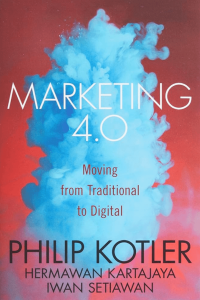In the constantly evolving landscape of marketing, staying abreast of the latest methodologies is not just beneficial, but necessary for solopreneurs seeking to make their mark. "Marketing 4.0: Moving from Traditional to Digital" by the revered marketing guru Philip Kotler, along with co-authors Hermawan Kartajaya and Iwan Setiawan, is not merely a book; it's a compass guiding you through the transition from the familiar terrain of traditional marketing to the uncharted territories of digital methodologies.

"Marketing 4.0" provides insights into the next revolution in marketing, where the shift is not only technological but also behavioral. The book explores how connectivity is changing the way consumers "see, think, do, and buy," and how businesses need to respond to these changes. The authors present a blend of classic marketing concepts and modern digital strategies, focusing on several key areas:
- Consumer Paths: Understanding the non-linear path consumers follow in the digital age, from awareness and advocacy to purchase.
- Human-Centric Marketing: Recognizing that digital consumers are more selective and skeptical, advocating for a marketing approach that is human-centric, relatable, and genuine.
- Content, Context, and Engagement: Emphasizing the importance of engaging content, contextual interactivity, and community-driven marketing.
- Parity between Online and Offline: Bridging the gap between online and offline interactions and understanding the consumer's journey across these mediums.
For solopreneurs, "Marketing 4.0" is a guiding light because it recognizes the diminishing boundaries between the digital and physical worlds. The book acknowledges the challenges faced by solopreneurs — limited resources, fierce competition, and rapidly changing consumer behaviors — and offers strategies that leverage digital tools to amplify impact.
However, it's crucial to understand that while "Marketing 4.0" offers a strategic overview of the transition from traditional to digital marketing, it doesn't provide an exhaustive manual on tactical execution. The book doesn't delve deeply into topics like SEO, social media algorithms, or email marketing mechanics. Instead, it offers a macro view, an understanding of changing consumer behaviors, and strategic directions for adapting to this new marketing era.
In conclusion, "Marketing 4.0: Moving from Traditional to Digital" is an indispensable read for solopreneurs stepping into the digital marketing arena. It's a navigational tool for the digital world, helping marketers understand not just where the consumers are, but where they're headed. In a marketplace where change is the only constant, this book is a reminder that the core of marketing remains the same: understanding human desires and needs. It's not about the platforms or the technology, but about the people using them. "Marketing 4.0" doesn't just teach you how to market in the digital world; it teaches you how to connect.
ChatGPT Prompts:
"Marketing 4.0: Moving from Traditional to Digital" by Philip Kotler, Hermawan Kartajaya, and Iwan Setiawan is a comprehensive guide to navigating the transition from conventional marketing to more complex, digital-driven strategies. Here are some specific prompts for this book:
Understanding the Concepts:
- "What are the key differences between Marketing 3.0 and Marketing 4.0, as defined by Kotler, Kartajaya, and Setiawan?"
- "How do the authors describe the role of digital technology in transforming consumer behaviors in 'Marketing 4.0'?"
Application of Principles:
- "How can a traditional business that's reliant on offline interactions use the principles of Marketing 4.0 to transition to digital successfully?"
- "The book discusses the integration of online and offline interactions. Can you provide practical strategies for businesses to achieve this?"
Comparison with Other Strategies:
- "How does Marketing 4.0's approach to customer engagement differ from that of previous marketing models?"
- "Can you compare the consumer's path in Marketing 4.0 with the traditional marketing funnel?"
Exploring Specific Concepts:
- "What is 'digital branding,' as outlined in 'Marketing 4.0,' and how can companies effectively implement it?"
- "How do 'paradoxes of technology' affect consumer behavior, according to 'Marketing 4.0'?"
Critiques and Limitations:
- "What are potential criticisms or limitations of the Marketing 4.0 model in today's rapidly evolving digital landscape?"
- "Are there industries or sectors for which the principles of Marketing 4.0 might be less relevant or effective?"
Expansion Ideas:
- "How can concepts from 'Marketing 4.0' be applied to the public sector or non-profit organizations?"
- "Can the principles of Marketing 4.0 be adapted for personal branding or individual content creators?"
Real-world Examples:
- "Can you identify a company or brand that embodies the principles of Marketing 4.0 in its strategy?"
- "What's an example of a marketing campaign that failed to integrate digital effectively, contrary to the principles of Marketing 4.0?"
Reflection and Personal Application:
- "How has 'Marketing 4.0' influenced your view of the relationship between technology and marketing?"
- "What strategies or concepts from 'Marketing 4.0' do you believe are most critical for marketers to understand and apply today?"
By harnessing the Power of Few-Shot and Multi-Shot Learning in Conversational AI, these prompts are designed to help readers delve deeper into the concepts of "Marketing 4.0," encouraging critical thinking about the transition to digital marketing and its practical applications across various sectors.
